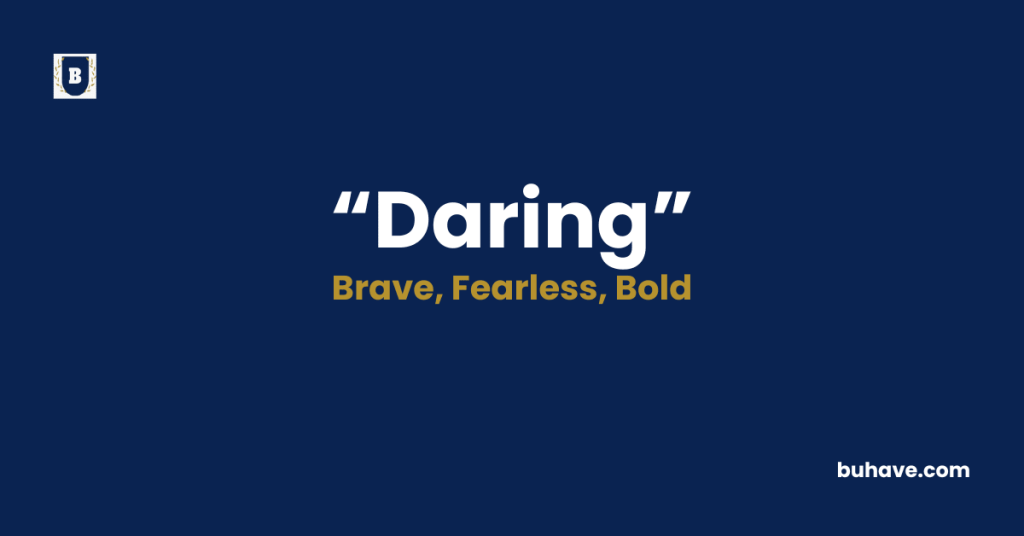The word ‘Daring’ (Adjective) describes the quality of boldly facing risks, danger, or uncertainty with courage and confidence. in this guide, you’ll learn the full definition, synonyms, antonyms, etymology, and real-life examples of how to use ‘Daring’ correctly in sentences.
Daring Explained in Depth
A complete and detailed guide to the words Daring including meaning, definition, examples, etymology, synonyms, and antonyms.
Meanings of Daring
Daring describes someone who bravely faces danger, challenges, or the unknown without hesitation. To begin with, a daring person often chooses to take bold actions, especially when others might feel afraid or uncertain. Furthermore, they push past fear and take risks in pursuit of something they believe in. In many cases, their courage inspires others, especially when they stand up for what is right or venture into new territory. In addition, daring can show up not only in dangerous situations but also in creative or groundbreaking decisions.
Ultimately, being daring means having the confidence and bravery to go beyond comfort zones.
Definition:
Daring refers to the quality of boldly facing risks, danger, or uncertainty with courage and confidence. To start with, a daring individual willingly steps into challenging or unfamiliar situations without fear. Moreover, this trait often involves taking bold actions that require determination and inner strength. In many cases, daring people act when others hesitate, which makes their bravery stand out even more. Additionally, their willingness to take chances helps them achieve breakthroughs,
whether in adventure, creativity, or leadership. Ultimately, being daring means pushing boundaries and embracing the unknown with a fearless spirit.
Etymology:
The word “daring” comes from the Old English verb “durran,” which meant “to brave” or “to venture.” Over time, the word evolved into “dere” and then into the verb “dare.” From that, the noun form “daring” emerged, referring to bold or courageous action. Moreover, the suffix “-ing” helped transform the verb into a noun or adjective that described the quality or act of courage. By the Middle English period, people commonly used “daring” to describe both brave behavior and the individuals who showed it.
Eventually, the modern spelling and meaning took shape, combining both the spirit of risk-taking and the strength of boldness.
Example Sentences:
- To begin with, she made a daring move by quitting her job to start her own business.
- Moreover, the firefighter rushed into the burning building, showing truly daring courage.
- In contrast to others, he chose the daring path through the mountains, even though it was riskier.
- Additionally, her daring fashion choices turned heads and inspired bold trends.
- As a result, his daring decision to speak out changed the direction of the conversation entirely
Daring Synonyms:
Daring Antonyms:
- Cowardly
- Cautious
- Timid
- Fearful
- Hesitant
- Reserved
- Careful
- Unadventurous
- Meek
- Shy
FAQs about Daring
Here are some Frequently Asked Questions (FAQs) about the word “daring”
1. What does “daring” mean?
Daring describes someone who is brave and willing to take risks. A daring person isn’t afraid to try something bold, even if it’s dangerous, difficult, or different from what others do.
2. Is being daring always a good thing?
It can be both good and risky. Being daring often leads to exciting discoveries, innovation, or adventure. However, if it means taking unnecessary or reckless risks, it might cause problems. It depends on the situation.
3. What’s the difference between “daring” and “brave”?
Brave means having courage in the face of fear or danger. Daring also involves courage but often includes taking bold actions that surprise others or push boundaries.
4. Can you give examples of daring behavior?
Sure!
- Climbing a mountain with little support.
- Starting a business no one believes in.
- Speaking up for what’s right when others stay silent.
- Performing a dangerous stunt.
5. Can “daring” describe things as well as people?
Yes. You can describe a plan, decision, outfit, or idea as daring if it’s bold or unconventional.
Example: “She wore a daring red dress to the event.”
6. Is “daring” the same as “reckless”?
Not exactly. Daring often suggests bravery with purpose. Reckless means taking risks without thinking about the consequences. A daring person might be bold but careful. A reckless person ignores danger.
7. How is “daring” used in a sentence?
- “He made a daring escape from the burning building.”
- “Her daring move changed the course of the game.”
Explore more D words:
- Positive words that start with D
- Negative words that start with D
- Adjectives that start with D
- Nouns that start with D
- Names that start with D
- Verbs that start with D
You can also submit guest post for publishing, write for us now.

















